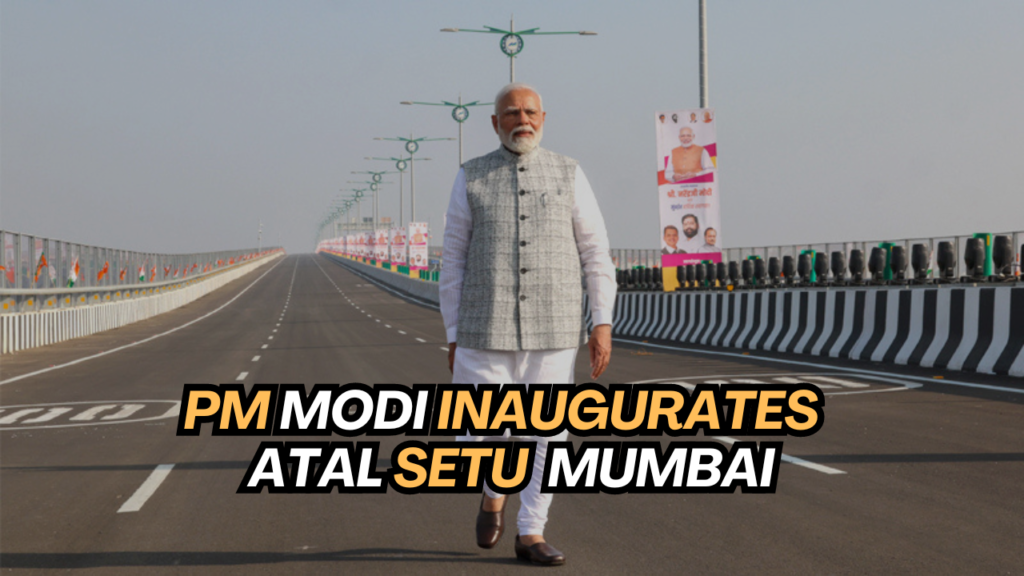India’s Longest Sea Bridge Atal Setu
On Friday, Prime Minister Narendra Modi inaugurated the Atal Bihari Vajpayee Seva-Nhava Sheva Atal Setu, also known as Atal Setu, built at a cost of ₹17,840 crores. This bridge, connecting South Mumbai to Navi Mumbai via Nhava-Sheva, will reduce travel time from two hours to just 20 minutes. It’s not only the longest bridge in India but also the longest sea bridge in the country. The 21.8 km-long Trans-Harbor Bridge includes a 16.5 km-long sea link. This bridge will provide rapid connectivity to the upcoming Navi Mumbai International Airport and decrease travel time between Mumbai and Pune. It will also enhance connectivity between the Mumbai Port and Jawaharlal Nehru Port.
The foundation stone for this bridge was laid by Prime Minister Modi in December 2016. Let’s find out how much toll one needs to pay for cars, buses, etc., to travel on this bridge.
Car Toll Charges:
To traverse the Atal Setu, people will have to pay toll charges based on single, return, daily pass, and monthly pass options. The toll for a single journey by car is ₹250, while a return journey will cost ₹375. For a daily pass, one needs to pay ₹625, and for a monthly pass, the cost is ₹12,500.
Mini Bus and LCV Toll Charges:
For a single journey, the toll is ₹400, for a return journey, it’s ₹600, for a daily pass, it’s ₹1,000, and for a monthly pass, it’s ₹20,000.
Bus/2 Axle Truck Toll Charges:
For a single journey, the toll is ₹830.
Monthly Pass Rates:
Additionally, for a return journey, the monthly pass costs ₹1,245, the daily pass is ₹2,075, and the monthly pass is ₹41,500.
MUV (3 Axle) Vehicle Toll Charges:
For a single journey, the toll is ₹905, for a return journey, it’s ₹1,360, for a daily pass, it’s ₹2,265, and for a monthly pass, it’s ₹45,250.
MUV (4-6 Axle) Vehicle Toll Charges:
If you have a vehicle with 4-6 axles, the toll for a single journey is ₹1,300, for a return journey it’s ₹1,950, for a daily pass it’s ₹3,250, and for a monthly pass, it’s ₹65,000.
Oversized Vehicles:
For oversized vehicles, toll charges are higher. For a single journey, it’s ₹1,580, for a return journey it’s ₹2,370, for a daily pass it’s ₹3,950, and for a monthly pass, it’s ₹79,000. These toll rates are applicable from January 13, 2024, to December 31, 2024.
How much cement and steel were used in building the bridge?
Approximately 177,903 metric tons of steel and 504,253 metric tons of cement were used in the construction of the Atal Setu bridge. It is expected that around 70,000 vehicles will traverse the bridge daily, and its lifespan is estimated to be 100 years. Motorists will be allowed to travel on this bridge at a maximum speed of 100 kilometers per hour. Heavy vehicles, motorcycles, auto-rickshaws, and tractors will not be permitted on the sea bridge. Specially designed light poles are incorporated to withstand strong winds during the monsoon. According to reports, a total of 5,403 laborers and engineers worked daily to complete this project.
“Atal Setu’s completion is a guarantee of PM Modi”
Prime Minister Narendra Modi inaugurated the Atal Setu, the country’s longest sea bridge connecting Mumbai and its suburb Navi Mumbai, on Friday. He stated that the completion of this project is his assurance. During a one-day visit to Maharashtra, the Prime Minister inaugurated the Atal Bihar Vajpayee Sevaar-Nhava Sheva Atal Setu, constructed at a cost of Rs 17,840 crore.
PM Modi, during a public meeting in Panvel, Raigad district, said, “When I came here on December 24, 2016, to lay the foundation stone of this sea bridge, which faced many challenges, I had resolved that there would be a change in the country. Despite the obstacles posed by the COVID-19 pandemic, the completion of the sea bridge is extremely important. He said, “People were frustrated as major projects were stalled, and they had lost hope that big projects would ever be completed. But this is Modi’s guarantee that the country will change.”
Also Read: Indore Secures 7th Cleanest City : Swachh Survekshan 2023 Highlights And Future Challenges

